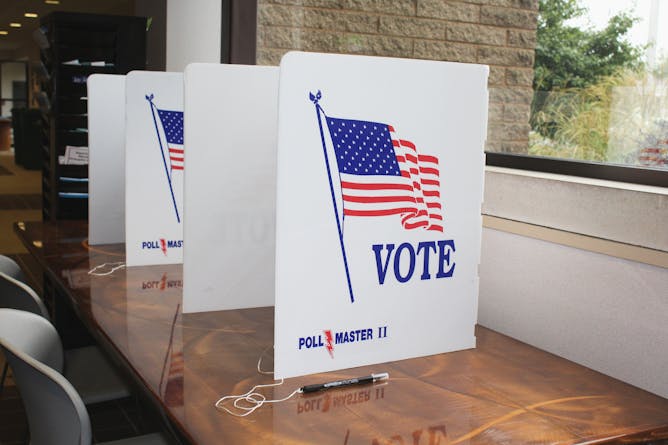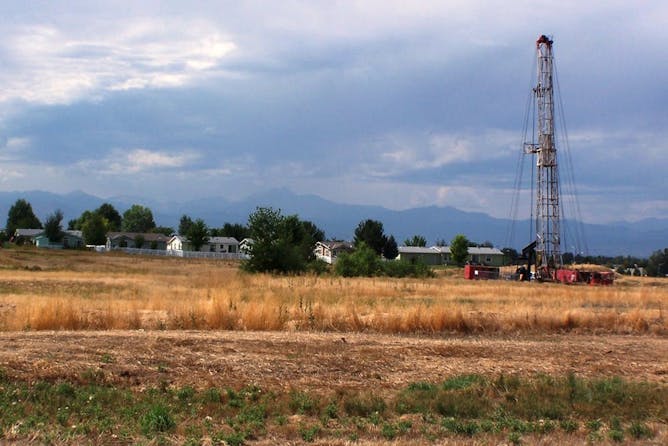Editor's note
|
|
Can polls really predict who will win an election? After Trump won, many questioned the science of polling and whether its methods can accurately capture voters’ opinions. But the University of Michigan’s Josh Pasek and Michael Traugott aren’t worried about polls on the midterm elections. They explain why – and share their tricks for understanding the numbers.
Colorado voters will have a chance in November to weigh in on something new: whether to bar oil and gas drillers from operating within 2,500 feet from schools, homes or other occupied structures. If voters do approve this measure, it would “mark a major change” in terms of influence communities have on fracking regulations, Colorado State University sociologists Tara Opsal and Stephanie Malin explain.
And have you ever heard of ASMR? People chase this autonomous sensory meridian response sensation by watching online videos of whispering voices, crinkling paper, hairbrushing and more, because it gives them “brain tingles.” Scholar Craig Richard explains what science knows about what for some is a shortcut to relaxation.
|
Aviva Rutkin
Big Data + Applied Mathematics Editor
|

|
|
Top stories
|

A Michigan township collects votes in 2016.
Barbara Kalbfleisch/shutterstock
Josh Pasek, University of Michigan; Michael Traugott, University of Michigan
How do you know whether to trust a poll? Look carefully at how it was conducted – and examine your own biases.
|

In Colorado, fracking often occurs right next to where people live.
Tara O'Conner Shelley
Tara Opsal, Colorado State University; Stephanie Malin, Colorado State University
Landowners told researchers that they lacked the knowledge, time and money to advocate for themselves, their financial interests and their property in negotiations over drilling leases.
|

Watching for the sweet, relaxing brain tingles.
skyNext/Shutterstock.com
Craig Richard, Shenandoah University
Some of the most popular online videos are of people whispering, turning book pages or gently tapping computer keys. What is going on? A researcher explains the quest for 'brain tingles.'
|
|
In the latest episode of our podcast "Heat and Light" on 1968, we speak with Boise State historian Jill Gill about how the Vietnam War cost the Protestant left its political clout and how conservative politicians built alliances with the evangelical right.
    
|
|
|
|
|
|
|
Politics + Society
|
-
Robert Muggah, Pontifical Catholic University of Rio de Janeiro (PUC-Rio)
Up to 5,000 refugees flee hunger and chaos in Venezuela each day – a migrant crisis rivaling Syria's. Most arrive to poor South American border cities that are dangerously unprepared for the influx.
-
Poco Kernsmith, Wayne State University; Joanne Smith-Darden, Wayne State University; Megan Hicks, Wayne State University
Incorporating lessons on healthy sexual behavior into sex ed classes and special prevention programs for youth could be key to reducing sexual violence, experts say.
|
|
Economy + Business
|
-
Gaurav Khanna, University of California San Diego; Munseob Lee, University of California San Diego
New research shows recruiting high-skilled immigrants leads to a 'meaningful' increase in innovation – and even more than spending money on research and development.
-
Sarah Webber, University of Dayton; Deborah Archambeault, University of Dayton
Adopting best practices like making it easier for staffers to blow the whistle when they observe wrongdoing can help.
|
|
Trending on site
|
-
Charles Hankla, Georgia State University
The US and China once again exchanged fire in their escalating trade war. Tariffs have been the main source of ammunition thus far, but China has other weapons it could begin to deploy.
-
Joshua Woods, West Virginia University
A disc-golf boom is coinciding with a ball-golf bust.
-
Myriam Renaud, University of Chicago
Author Salman Rushdie's book goes to the heart of Muslim religious beliefs and challenges some of the most sensitive tenets.
|
|
|
|
| |
| |
|
|